Luhao Zhang
SCoder: Iterative Self-Distillation for Bootstrapping Small-Scale Data Synthesizers to Empower Code LLMs
Sep 09, 2025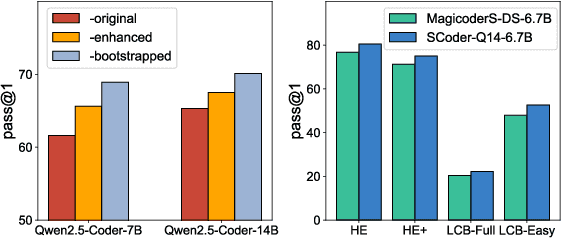
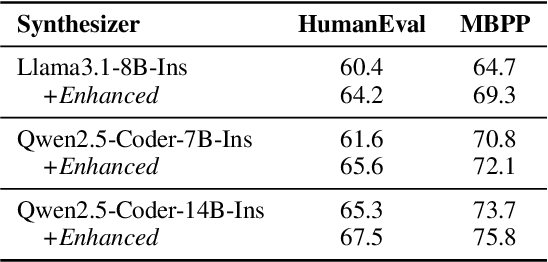
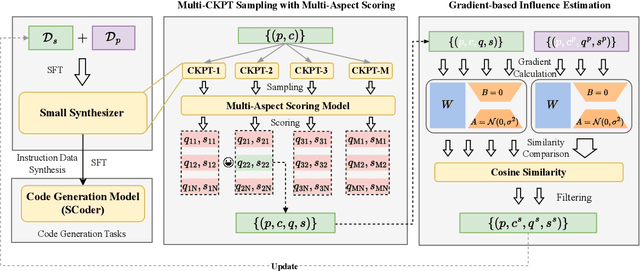
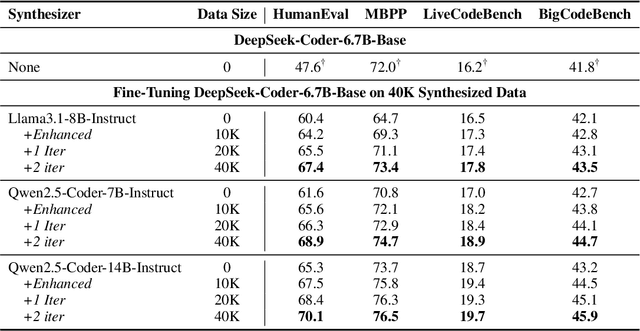
Abstract:Existing code large language models (LLMs) often rely on large-scale instruction data distilled from proprietary LLMs for fine-tuning, which typically incurs high costs. In this paper, we explore the potential of small-scale open-source LLMs (e.g., 7B) as synthesizers for high-quality code instruction data construction. We first observe that the data synthesis capability of small-scale LLMs can be enhanced by training on a few superior data synthesis samples from proprietary LLMs. Building on this, we propose a novel iterative self-distillation approach to bootstrap small-scale LLMs, transforming them into powerful synthesizers that reduce reliance on proprietary LLMs and minimize costs. Concretely, in each iteration, to obtain diverse and high-quality self-distilled data, we design multi-checkpoint sampling and multi-aspect scoring strategies for initial data selection. Furthermore, to identify the most influential samples, we introduce a gradient-based influence estimation method for final data filtering. Based on the code instruction datasets from the small-scale synthesizers, we develop SCoder, a family of code generation models fine-tuned from DeepSeek-Coder. SCoder models achieve state-of-the-art code generation capabilities, demonstrating the effectiveness of our method.
Design of a Wearable Parallel Electrical Impedance Imaging System for Healthcare
May 25, 2025Abstract:A wireless wearable electrical impedance tomography (EIT) system has been developed using the AD5933 for real-time lung respiration imaging. The system uses a current injection method tailored to the human body's impedance characteristics. It applies a voltage excitation and measures the resulting current as the voltage passes through the body. Additionally, measures are taken to suppress the effects of parasitic capacitance, which can lead to signal oscillations and leakage currents. Additionally, to improve data acquisition speed, five AD5933 units are used for parallel measurements, with multiple measures taken to ensure high synchronization during the parallel acquisition process. The results demonstrate conductivity images generated from the EIT system, with data collected from a water tank, human lungs during respiration, and a human calf at rest, confirming that this portable EIT system can measure biological tissues with high precision and low cost.
Auditing and Enforcing Conditional Fairness via Optimal Transport
Oct 17, 2024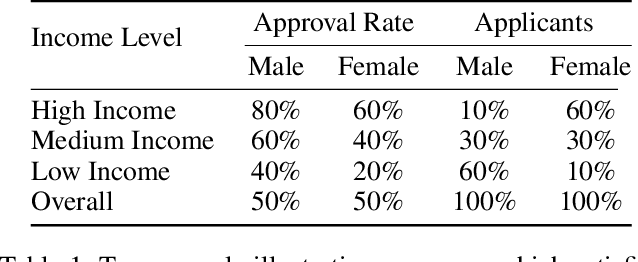



Abstract:Conditional demographic parity (CDP) is a measure of the demographic parity of a predictive model or decision process when conditioning on an additional feature or set of features. Many algorithmic fairness techniques exist to target demographic parity, but CDP is much harder to achieve, particularly when the conditioning variable has many levels and/or when the model outputs are continuous. The problem of auditing and enforcing CDP is understudied in the literature. In light of this, we propose novel measures of {conditional demographic disparity (CDD)} which rely on statistical distances borrowed from the optimal transport literature. We further design and evaluate regularization-based approaches based on these CDD measures. Our methods, \fairbit{} and \fairlp{}, allow us to target CDP even when the conditioning variable has many levels. When model outputs are continuous, our methods target full equality of the conditional distributions, unlike other methods that only consider first moments or related proxy quantities. We validate the efficacy of our approaches on real-world datasets.
Laser: Parameter-Efficient LLM Bi-Tuning for Sequential Recommendation with Collaborative Information
Sep 03, 2024



Abstract:Sequential recommender systems are essential for discerning user preferences from historical interactions and facilitating targeted recommendations. Recent innovations employing Large Language Models (LLMs) have advanced the field by encoding item semantics, yet they often necessitate substantial parameter tuning and are resource-demanding. Moreover, these works fails to consider the diverse characteristics of different types of users and thus diminishes the recommendation accuracy. In this paper, we propose a parameter-efficient Large Language Model Bi-Tuning framework for sequential recommendation with collaborative information (Laser). Specifically, Bi-Tuning works by inserting trainable virtual tokens at both the prefix and suffix of the input sequence and freezing the LLM parameters, thus optimizing the LLM for the sequential recommendation. In our Laser, the prefix is utilized to incorporate user-item collaborative information and adapt the LLM to the recommendation task, while the suffix converts the output embeddings of the LLM from the language space to the recommendation space for the follow-up item recommendation. Furthermore, to capture the characteristics of different types of users when integrating the collaborative information via the prefix, we introduce M-Former, a lightweight MoE-based querying transformer that uses a set of query experts to integrate diverse user-specific collaborative information encoded by frozen ID-based sequential recommender systems, significantly improving the accuracy of recommendations. Extensive experiments on real-world datasets demonstrate that Laser can parameter-efficiently adapt LLMs to effective recommender systems, significantly outperforming state-of-the-art methods.
A Simple Duality Proof for Wasserstein Distributionally Robust Optimization
Apr 30, 2022
Abstract:We present a short and elementary proof of the duality for Wasserstein distributionally robust optimization, which holds for any arbitrary Kantorovich transport distance, any arbitrary measurable loss function, and any arbitrary nominal probability distribution, as long as certain interchangeability principle holds.
 Add to Chrome
Add to Chrome Add to Firefox
Add to Firefox Add to Edge
Add to Edge